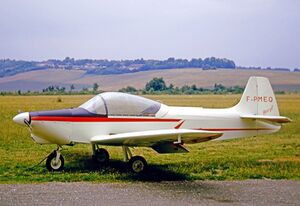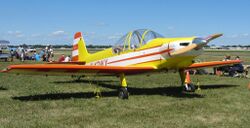Engineering:Piel Beryl
| Piel CP.70 Beryl | |
|---|---|

| |
| The prototype CP.70 Beryl F-PMEQ at Beynes-Thiverval airfield near Beynes, Yvelines near Paris in August 1965 | |
| Role | Sport aircraft |
| National origin | France |
| Manufacturer | Homebuilt |
| Designer | Claude Piel |
| First flight | ca. 1965 |
| Status | in current operation |
| Primary user | private pilot owners |
The Piel CP.70 Beryl is a French twin-seat, single-engine sport aircraft designed by Claude Piel. It was first flown in France in the 1960s and marketed for amateur construction.[1][2]
Design and development
Designed by Claude Piel, the Beryl uses the same wing design as the Piel Emeraude but with a new fuselage, exchanging the Emeraude's side-by-side configuration seating for seating in tandem. As originally designed, the aircraft is fitted with fixed, tricycle undercarriage with a steerable nosewheel. Construction throughout is of doped fabric-covered wood.[2][3][4]
An aerobatic version, designated the CP.750 was also developed. This differs from the basic CP.70 in having a reduced wingspan, fixed tailwheel undercarriage and a slightly longer fuselage. It retains the CP.70's wooden wings, but the fuselage is built of welded steel tube and still covered in fabric.[3]
Operational history
The Beryl has been homebuilt by amateur constructors and in 2009 there were still four examples active on the French civil aircraft register. The prototype F-PMEQ, completed in 1965 with tricycle undercarriage, was still active in 2014 modified as a CP.703 with tail-wheel undercarriage. Examples of the design have also been completed in Brazil and the United States.
Variants
- CP.70
- Standard variant for homebuilding powered by a 65 hp (48 kW) Continental A65-8F or 118 hp (88 kW) Lycoming O-235 engine.[1][4]
- CP.750
- a CP-70 with 150 hp Lycoming O-320 engine with a reduced wingspan, fixed tailwheel undercarriage, and a slightly longer fuselage.[3]
- CP.751
- CP-750 with 200 hp Lycoming O-360-A2A engine.[5]
Specifications (CP.70)
Data from Jane's All the World's Aircraft 1977–78, p.496
General characteristics
- Crew: One pilot
- Capacity: 1 passenger
- Length: 6.45 m (21 ft 2 in)
- Wingspan: 8.25 m (27 ft 1 in)
- Height: 1.60 m (5 ft 3 in)
- Wing area: 10.9 m2 (117 sq ft)
- Empty weight: 320 kg (700 lb)
- Gross weight: 540 kg (1,190 lb)
- Powerplant: 1 × Continental A65-8F , 49 kW (65 hp)
Performance
- Maximum speed: 175 km/h (109 mph, 95 kn)
- Range: 600 km (372 mi, 323 nmi)
- Service ceiling: 3,000 m (9,850 ft)
Notes
- ↑ 1.0 1.1 Taylor 1989, p.725
- ↑ 2.0 2.1 Tacke, Willi; Marino Boric; et al: World Directory of Light Aviation 2015–16, page 100. Flying Pages Europe SARL, 2015. ISSN 1368-485X
- ↑ 3.0 3.1 3.2 Jane's All the World's Aircraft 1977–78, p.496
- ↑ 4.0 4.1 Bayerl, Robby; Martin Berkemeier; et al: World Directory of Leisure Aviation 2011–12, page 96. WDLA UK, Lancaster UK, 2011. ISSN 1368-485X
- ↑ "French homebuilts gather at RSA rally" 1981, p.545
References
- "French homebuilts gather at RSA rally". Flight International: 545. 22 August 1981. http://www.flightglobal.com/pdfarchive/view/1981/1981%20-%202729.html. Retrieved 2009-01-06.
- Jane's All the World's Aircraft 1977–78. London: Jane's Publishing.
- Taylor, Michael J. H. (1989). Jane's Encyclopedia of Aviation. London: Studio Editions. ISBN 0-7106-0710-5.
 |


